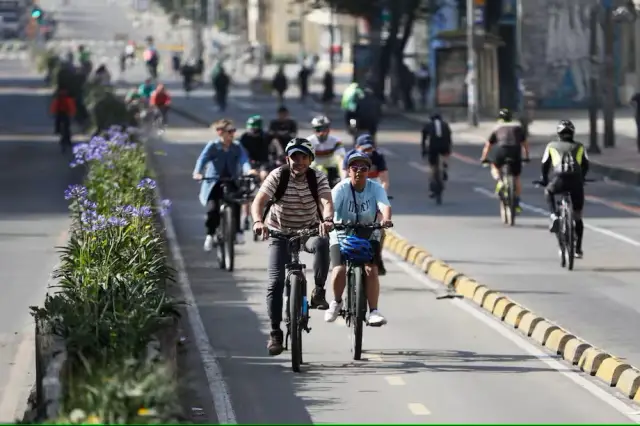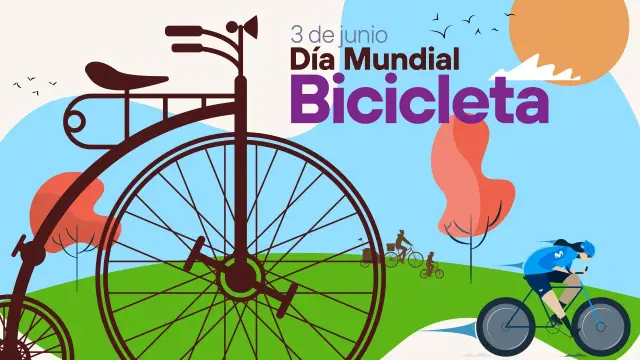Every June 3rd, World Bicycle Day is celebrated, a date proclaimed by the UN to highlight the benefits of this efficient and sustainable means of transportation. In Colombia, the bicycle has gained prominence as a viable alternative for improving urban mobility, reducing pollution, and promoting a healthy lifestyle. From public policies to citizen initiatives, the country has made significant progress in promoting the use of bicycles as a means of daily transportation.
The bicycle in Colombia: a growing alternative
In recent years, Colombia has experienced an increase in bicycle use. According to an Ipsos survey, at least 37% of Colombian adults use a bicycle at least once a week, and for 16%, it is their primary means of transportation for short distances.
This growth is due to several factors, including:
Cycling infrastructure: Cities like Bogotá have more than 600 km of cycle paths, facilitating safe travel for cyclists.
Public bicycle programs: Medellín implemented the EnCicla system, which offers free bicycles to citizens, promoting sustainable mobility.
Events and campaigns: Initiatives such as "Car-Free and Motorcycle-Free Day" in Bogotá encourage the use of alternative means of transportation, including bicycles.
Public policies that promote bicycle use
The Colombian government has implemented various policies to promote bicycle use:
Law 1811 of 2016
This law encourages bicycle use through benefits such as a half-day of paid leave for public employees who certify they have cycled to work 30 times.
National Program for the Promotion of Bicycle Use (PFUB)
Launched by the Ministry of Transportation, this program seeks to increase bicycle travel, mitigate the environmental impact of motor vehicle traffic, and improve urban mobility.
Benefits of using a bicycle
Adopting the bicycle as a means of transport offers multiple benefits:
Physical and mental health: Regular cycling improves physical fitness and reduces stress.
Emission reduction: As a non-motorized means of transport, the bicycle contributes to reducing air pollution.
Economic savings: The costs associated with using a bicycle are significantly lower compared to motorized vehicles.
Challenges and challenges
Despite the progress, there are challenges that must be addressed to consolidate bicycle use in Colombia:
Road safety: Safety conditions for cyclists need to be improved, including the implementation of adequate infrastructure and awareness campaigns.
Civic culture: Promoting respect and coexistence among cyclists, pedestrians, and drivers is essential for sustainable mobility.

Outstanding initiatives in Colombia
Bike paths in Bogotá
Since 1975, Bogotá has implemented bike lanes, temporarily closing some main roads on Sundays and holidays for the exclusive use of cyclists and pedestrians.
EnCicla in Medellín
This public bicycle system, operated by the Aburrá Valley Metropolitan Area, offers free bicycles and integrates with the public transportation system, facilitating sustainable mobility.
Recommendations to encourage the use of bicycles
Adequate infrastructure: Invest in the construction and maintenance of safe, well-marked cycle paths.
Road safety education: Implement educational programs that promote respect and coexistence among all road users.
Incentives: Offer benefits to those who use bicycles as a means of transportation, such as discounts or free days.
Frequently Asked Questions
When is World Bicycle Day celebrated?
June 3, as proclaimed by the UN in 2018.
What benefits does Law 1811 of 2016 offer?
Grants a half-day of paid leave to public employees who certify having cycled to work 30 times.
What is EnCicla?
It is Medellín's public bicycle system, which offers free bicycles to promote sustainable mobility.
Which Colombian cities have bike lanes?
Bogotá is a pioneer with its Sunday bike lanes, but other cities like Medellín and Cali have also implemented these initiatives.
What challenges does bicycle use face in Colombia?
Road safety and civic culture are some of the main challenges.
Pedaling towards a sustainable future
The celebration of World Bicycle Day is an opportunity to reflect on the importance of this mode of transportation in building more sustainable and healthier cities. Colombia has made progress in promoting bicycle use, but there is still a long way to go. It is essential to continue implementing public policies, improving infrastructure, and fostering a culture of respect and coexistence on the roads. Adopting bicycles not only benefits the individual, but also the environment and society as a whole. Join World Bicycle Day: Colombia and its commitment to sustainable mobility! Join the change and pedal toward a better future!
